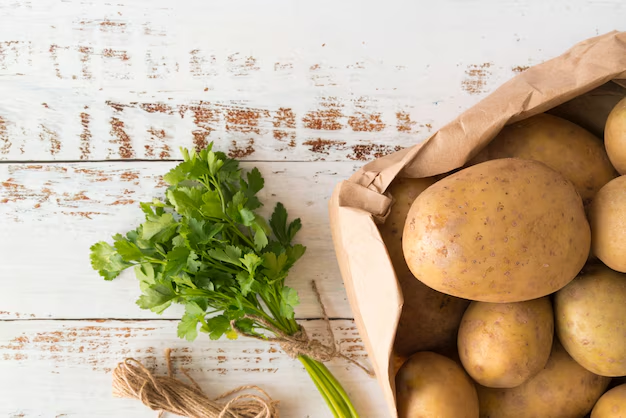How Long Do Cooked Potatoes Last in the Refrigerator? Find Out Now!
There's nothing quite like the versatility of a potato. Whether mashed, roasted, or boiled, potatoes are a staple in countless kitchens worldwide. But once you've taken the time to cook them, you might find yourself asking, "How long do these potatoes last in the refrigerator?" This question is more than just a matter of curiosity—it's essential for food safety and efficiency in your kitchen. Let's dive into everything you need to know about storing cooked potatoes safely.
🥔 The Basics of Cooked Potato Storage
How Long Can Cooked Potatoes Last?
Proper storage can significantly extend the lifespan of your cooked potatoes. In general, cooked potatoes can last in the refrigerator for 3 to 5 days. This timeframe ensures that the potatoes remain safe to eat while maintaining their texture and flavor.
Why the Refrigerator?
Refrigeration slows down bacterial growth, including the growth of pathogens that could lead to foodborne illnesses. While it's not foolproof, storing cooked potatoes in the fridge is a key step in keeping them fresh and safe for consumption.
Signs Your Potatoes Have Gone Bad
Even with optimal storage, it’s crucial to recognize when cooked potatoes have surpassed their shelf life. Here are some warning signs:
- Off-putting odor: If your potatoes have developed a sour or rancid smell, it's time to dispose of them.
- Slimy texture: A slimy surface indicates bacterial growth.
- Mold: Visible mold is a clear indicator that your potatoes should be discarded.
📦 Proper Storage Techniques
Refrigeration Tips
For the freshest potatoes, follow these storage tips:
- Cool Before Storing: Allow cooked potatoes to cool to room temperature before refrigerating them. This helps prevent condensation, which creates moisture and encourages bacterial growth.
- Use Airtight Containers: Store potatoes in airtight containers or sealable bags to maintain their flavor and prevent contamination.
- Label with Dates: Label containers with the date you cooked the potatoes to keep track of their freshness.
To Peel or Not to Peel?
When storing, it doesn’t matter whether the potatoes are peeled or unpeeled; both can be stored the same way. However, leaving the peel on can sometimes help preserve the potato's texture and protect its natural moisture content.
Avoid Freezing!
While freezing cooked potatoes is possible, be aware that they may not maintain their original texture after thawing. If freezing, mashed or pureed potatoes tend to fare better than whole or sliced potatoes.
🌡️ The Importance of Temperature Control
Keeping It Cool
The ideal temperature for storing cooked potatoes in the refrigerator is around 40°F (4°C). This temperature is low enough to deter bacterial growth but not so cold that it alters the texture or taste of the potatoes.
Beware of Temperature Variations
Frequent temperature fluctuations can hasten spoilage. Try to avoid storing potatoes in areas of the refrigerator where the temperature varies widely, such as in the door.
🍽️ Using Stored Potatoes Wisely
Revitalize Your Leftovers
Leftover potatoes are incredibly versatile. Consider these delicious ways to use them:
- Potato Salad: Chop and mix with your favorite dressing and seasonings.
- Potato Soup: Blend with broth, garlic, and onion for a creamy soup.
- Roasted Potatoes: Reheat by roasting with herbs and spices for extra flavor.
- Potato Pancakes: Mash and fry with a bit of onion and egg.
Reheating Tips
When reheating, ensure potatoes reach an internal temperature of 165°F (74°C) to keep them safe to eat. Use a microwave, oven, or stovetop to heat the potatoes thoroughly.
📝 Quick Reference Summary
Here's a handy checklist for storing and using cooked potatoes:
- 🌡 Cool Before Storing: Always let them cool to room temperature first.
- 🛑 Don't Forget Airtight: Use airtight containers or bags.
- 📅 Label with Date: Track storage times easily.
- 👃 Check for Odor: When in doubt, sniff it out.
- 👀 Watch for Mold: Discard if spotted.
- ♻️ Reheat Safely: Always heat to 165°F.
Expanding Your Knowledge: Related Topics
Understanding Potato Varieties
Different potato varieties have different flavors, textures, and storage capabilities. Learn how types like russets, Yukon Golds, and red potatoes behave after cooking for optimal storage.
The Science of Starch
Understanding the starch content in potatoes can help in choosing the best cooking method and storage time. High-starch potatoes like russets store differently than waxy varieties like red or fingerling potatoes.
The Impact of Oils and Additives
If you’ve incorporated any oils, butter, or seasonings while cooking, be aware that these ingredients can affect the shelf life of your stored potatoes. For instance, olive oil boosts flavor but can hasten spoilage if exposed to air.
By understanding these nuances, you'll not only make the most out of your spuds but also ensure safety and efficiency in your kitchen. Potatoes may be humble, but equipped with this knowledge, you'll be a master in food storage and meal prep!
Wrap-Up: Potatoes as a Kitchen Staple
Stored properly, cooked potatoes offer a world of culinary opportunities. Their versatility makes them a valuable addition to any meal plan, whether you're looking to whip up a quick side dish or infuse your recipes with some carb-rich goodness.
With these tips and insights in mind, your next batch of potatoes will be fresh, flavorful, and always ready to steal the show at your dinner table! 🍽️

